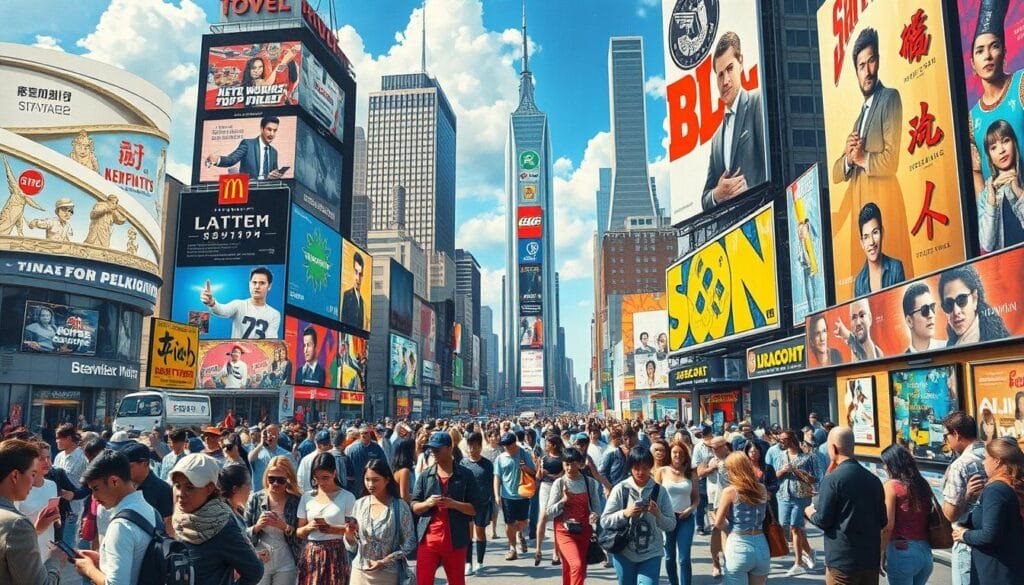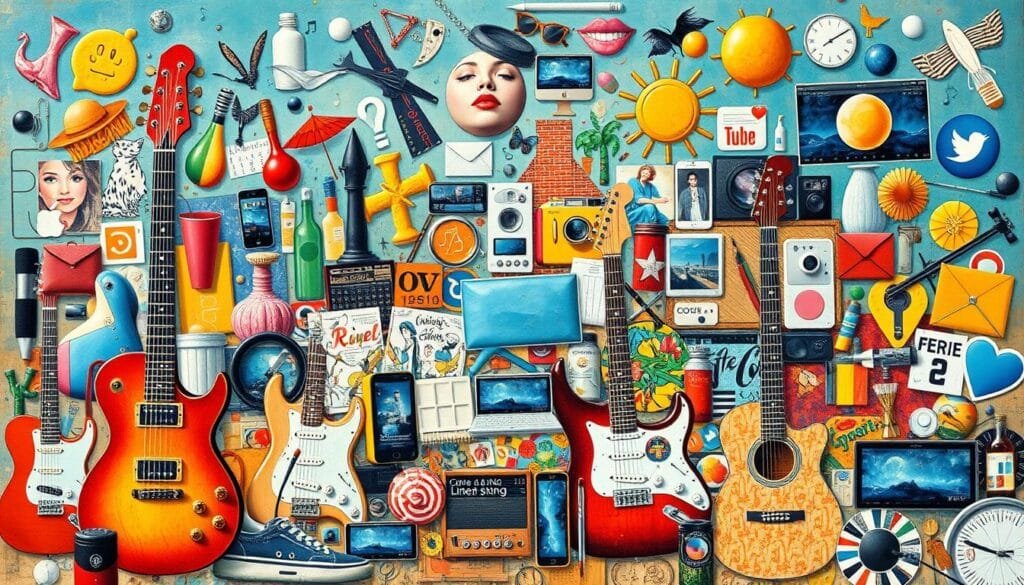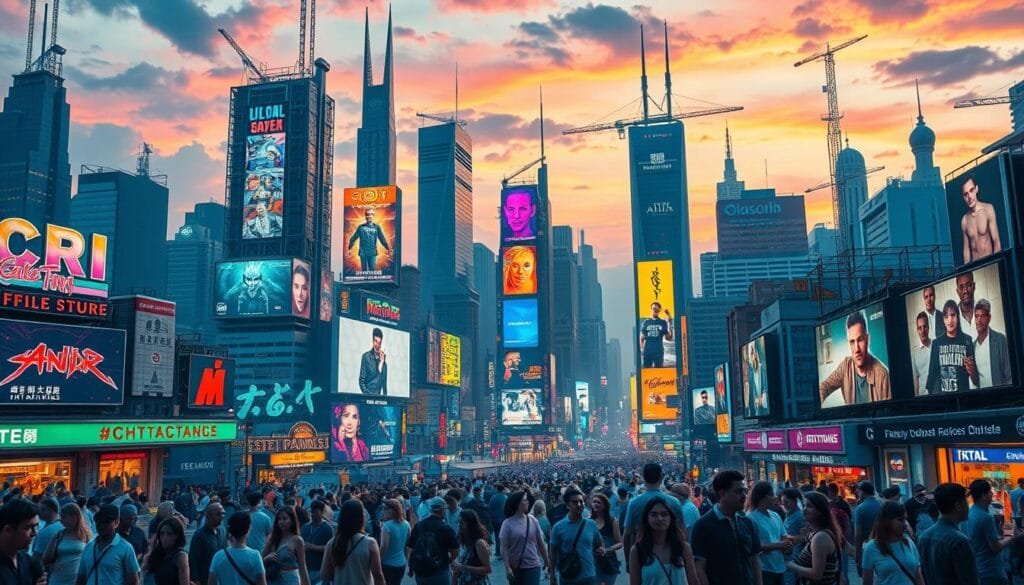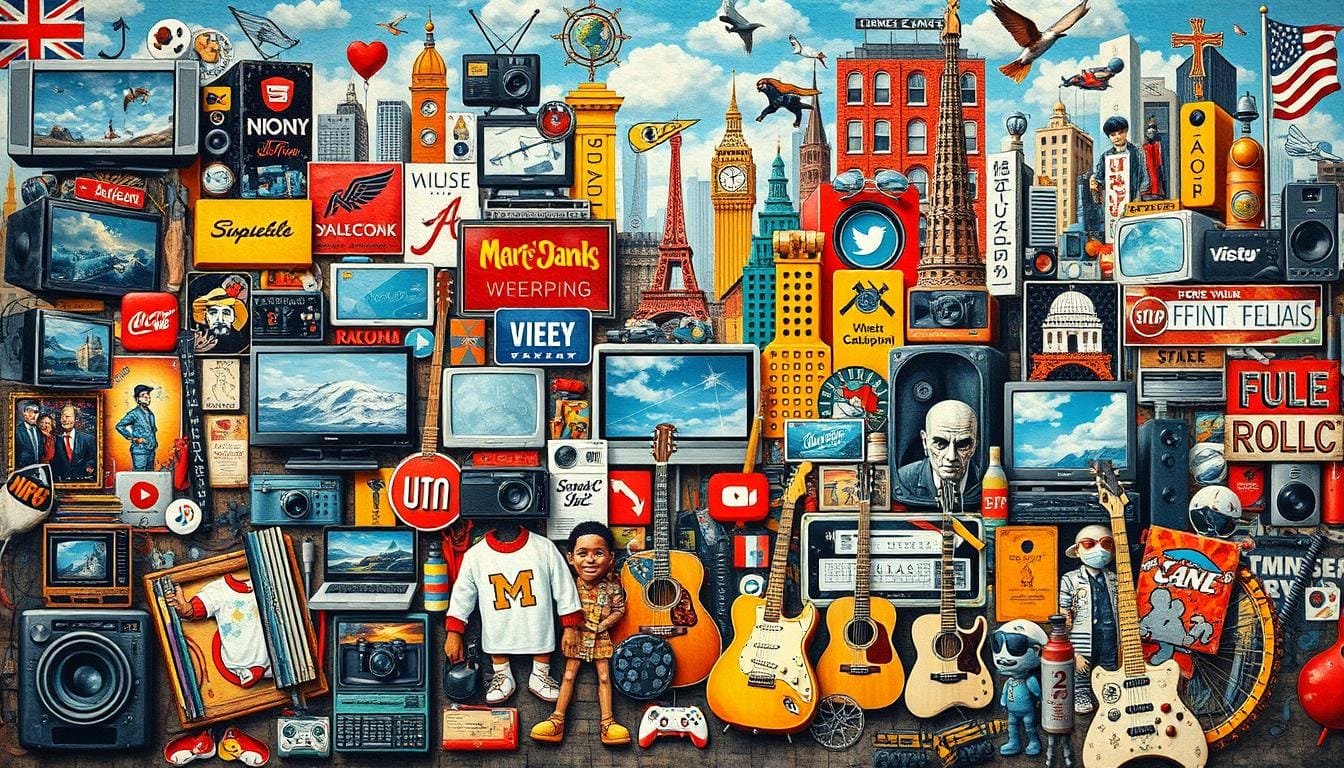Imagine if our society was shaped not by classical art, but by the songs we hear every day. The shows we can’t stop watching, and the memes we love to share. Popular culture is more than just fun; it starts conversations, sets trends, and can even change society. It includes everything from music and TV to books and online media. It changes as new tech appears and society shifts. But do we really understand how deeply it affects us?
The idea of popular culture started in the mid-1800s, changing a lot after World War II with the growth of mass media. Many people love this culture which grew from the Industrial Revolution consumer markets. Nowadays, it’s often driven by specific groups and online communities. Looking closer at popular culture shows us it’s not just for entertainment. It mirrors and shapes the spirit of our times.
Key Takeaways
- Popular culture spans music, television, literature, and digital media.
- Post-World War II mass media innovations significantly shaped modern popular culture.
- Consumer culture and mass media play a crucial role in defining what’s popular.
- Popular culture is influenced by niche communities and social media.
- Understanding popular culture provides insights into societal trends and behaviors.
Introduction to Popular Culture
Popular culture, or “pop culture,” includes trends, ideas, and images familiar to the general public. It has a global impact, helped by technology and media. This makes sharing and engaging with it easy.
Definition and Scope of Popular Culture
Understanding popular culture means seeing its wide influence. It mirrors American diversity, covering different cultures. Pop culture spans TV, music, movies, and ads. It’s a big part of our daily life.
Shows like “The Simpsons” and “Modern Family” offer social commentary with humor. Music genres, such as rock and rap, show how cultural influences shape society.
The Evolution of Popular Culture
Pop culture has evolved with cultural and technological changes. Starting in the late 20th century, it changed with reality TV and binge-watching. These shifts altered how we view content.
The commercialization of holidays like Christmas shows its reach, even in places like Japan and China. Social media’s role in ads highlights changes in cultural standards. Movies often critique the American dream and societal values.
Pop culture’s journey shows its role in shaping and challenging global cultural norms.
The Impact of Popular Culture on Society
Popular culture shapes how we see the world. It influences consumer habits and social awareness. Let’s explore how pop culture affects our society today.
Promotion of Diversity and Inclusivity
Pop culture promotes diversity in pop culture and inclusivity in media. Movies, TV shows, and music show us different kinds of people and ways of life. This helps us understand and accept each other better. For example, “Pose” and “Orange Is the New Black” showcase diverse characters. They have sparked conversations about LGBTQ+ rights, race, and gender. This shows how pop culture and social change are linked.

Social Awareness
Pop culture is a tool for bringing attention to social issues. For instance, “13 Reasons Why” and songs supporting “Black Lives Matter” raise awareness. These stories and music highlight the importance of discussing mental health, environment, and justice. They make these issues more relatable and easier to understand.
Inspiration and Aspiration
Pop culture motivates us to follow our dreams. Celebrity endorsements influence many people’s choices. The influencer market is also growing rapidly. This shows the power of pop culture to inspire us to achieve more in our lives.
Community Building
Pop culture helps create communities. Social media sites like Instagram and TikTok connect fans worldwide. These platforms spread trends quickly and bring people together. Big events, such as Comic Con, gather thousands of fans, showing the strong communities formed through pop culture.
| Pop Culture Influence | Statistics |
|---|---|
| Impact on Consumer Behavior | 49% influenced by celebrity endorsements |
| Influencer Marketing Industry Growth | Projected $16.4 billion by 2022 |
| Fashion Inspiration | 70% inspired by celebrities and influencers |
| Millennials’ Purchasing Decisions | 71% influenced by pop culture |
| Teenagers’ Social Media Use | Over 80% use social media daily |
| Attendance at Pop Culture Events | Over 130,000 in major cities |
What Is Popular Culture?
Popular culture is about the arts and entertainment that most people love. It’s important to know the cultural influences behind these trends.

Mass media shapes popular culture a lot, with 70% of trends starting there. TV, music streaming, and social media are big influencers.
In cities, 60% enjoy popular culture online, but only 40% in rural areas do. Since the 2000s, the internet has boosted user content by 50%. This allows for more diverse trends to spread fast.
For people aged 18-34, social media is key to finding new trends. This shows its big impact on what young people like.
Globalization changes popular culture by mixing different cultures, about 30% of the time. Over half see it as a way to connect people, but 45% think it can divide us too.
Now, over 70% get into popular culture through digital means, not traditional media. Popular trends go global in three months, much quicker than before.
To understand popular culture is to see how it mirrors and affects our society. It shows what we value and hope for as a community.
The Positive Effects of Popular Culture
Popular culture has a big impact on our society. It sparks lots of new ideas in pop culture, thanks to creative minds. These artists and creators get to try out new ideas and ways of expressing themselves.
Creativity and Innovation
Pop culture is a great place for creative minds. It blends different styles and backgrounds. Because of this mix, we see new and original content that appeals to many people. This leads to amazing achievements in art.

Economic Growth
Pop culture also helps the economy grow. It creates jobs and money through movies, TV, and online content. This boosts spending by consumers and leads to new tech developments.
Cultural Exchange
It allows for the sharing of cultures across the globe. People get to experience and share art and traditions from different places. This builds cultural understanding and empathy among different communities.
“Empathy scores can increase by up to 30% in certain demographics exposed to diverse narratives.”
Entertainment and Stress Relief
A big benefit of pop culture is how it entertains and relieves stress. It offers a break from the everyday, reducing stress through leisure and escapism.
Charitable Initiatives
Celebrities in pop culture often promote charity. They use their fame to boost awareness and funds for good causes. An example is Oprah Winfrey and her efforts to help others.
Education and Learning
Pop culture can also be educational. It presents learning in an engaging way. This makes it easier to understand complex topics, improving the learning experience.
| Aspect | Impact |
|---|---|
| Empathy | Increases empathy by up to 30%. |
| Economic Contribution | Generates jobs, drives consumer spending. |
| Cultural Exchange | Enhances understanding through shared media. |
| Entertainment | Provides escapism and stress relief. |
| Charity | Raises awareness and funds through celebrity influence. |
| Education | Makes learning more accessible through engaging media. |
The Negative Effects of Popular Culture
While popular culture has many pros, it also poses several cons. We need to understand these negative impacts on society.
Reinforcement of Stereotypes
Pop culture often sticks to stereotypes, which can hurt how we see different groups. For example, showing certain people in fixed roles can lead to bias and misunderstanding. A survey found that 55% think pop culture harms their sense of self.
Desensitization to Violence
Violence in media is a big problem. Many kids come to accept violence and bad language as normal because of what they see in the media. Around 33% blame pop culture for teen violence; 21% point to TV specifically.
Erosion of Privacy
Public figures often lose their privacy due to our obsession with celebrities. This constant attention can badly affect their mental health.
Consumerism and Materialism
Pop culture pushes buying more, leading to a materialistic mindset and unsustainable habits. About 70% follow social media stars for buying advice, leading to more sameness.
Influence on Risky Behaviors
Pop culture can make dangerous behaviors look cool. Things like drug use, fast driving, and other risky acts. Half of young people think pop culture encourages them to adopt these unhealthy behaviors.
Body Image Issues
Media sets unrealistic beauty standards, impacting how we feel about ourselves. Around 65% say these standards push people towards goals they can’t reach.
Political Polarization
Pop culture’s bias can divide us further by only showing certain viewpoints. About 48% of people feel this pulls them away from traditional values, impacting younger generations and society broadly.
| Negative Effects | Statistical Data |
|---|---|
| Reinforcement of Stereotypes | 55% feel individuality is compromised |
| Desensitization to Violence | 33% blame popular culture for teen-age violence |
| Erosion of Privacy | Frequent celebrity invasions |
| Consumerism and Materialism | 70% rely on social media influencers |
| Influence on Risky Behaviors | 50% feel pressured towards unhealthy habits |
| Body Image Issues | 65% believe in unrealistic beauty standards |
| Political Polarization | 48% see a shift from traditional values |
Conclusion
Exploring popular culture shows how important it is for understanding our society. It reflects on changing norms from the Industrial Revolution to now. Pop culture influences many areas. It supports diversity, sparks creativity, and helps economies grow.
Yet, pop culture isn’t all positive. It can spread stereotypes and make us numb to violence. Issues like consumerism and body image concerns are real. With cultures mixing globally, we must watch out for losing unique traditions.
We should think deeply about pop culture’s role in society and the economy. While it brings people together on platforms like TikTok, it can also weaken traditional values. Being mindful about pop culture helps us enjoy its benefits and avoid the negatives.
FAQ
What is the definition and scope of popular culture?
Popular culture covers attitudes, ideas, images, and other things in mainstream culture. It’s spread mainly through music, TV, literature, and the internet. These mediums shape our society’s norms, trends, and how we act.
How has popular culture evolved over time?
After the industrial revolution, popular culture saw major changes. The growth of the middle class and mass media played a part. Entertainment became easier to get, changing how we view and interact with culture.
In what ways does popular culture promote diversity and inclusivity?
It makes a point to show different kinds of people in media. This leads to more understanding and acceptance. We see diverse cultures and stories, making our society more inclusive.
How does popular culture raise social awareness?
Popular culture talks about important issues like mental health, the environment, and justice. It gets people talking and acting on these big topics. This way, it makes a real difference.
Can popular culture inspire individuals to aspire and achieve more?
Yes, characters and stories in pop culture can inspire us. They push us to chase our dreams. This can lead to success in our personal and professional lives.
How does popular culture contribute to community building?
It brings people together who like the same things. These shared interests help create a sense of unity and belonging. It’s a way to find your people.
What positive impacts does popular culture have on creativity and innovation?
Creators use diverse influences to make content that speaks to many. This creativity leads to new kinds of art. Popular culture pushes the boundaries of what’s possible.
What is the economic impact of popular culture?
It boosts the economy by creating jobs and bringing in money. Film, music, and digital media industries benefit. Plus, it encourages new tech developments.
In what ways does popular culture facilitate cultural exchange?
It allows us to share and experience different cultures. Through media, we can explore art, traditions, and ways of life from around the world. This builds appreciation and understanding.
How does popular culture serve as a source of entertainment and stress relief?
It offers a break from reality and helps us relax. Through various forms of entertainment, we find joy and a way to unwind in our busy lives.
Do celebrities and cultural icons engage in charitable initiatives through popular culture?
Yes, they use their platforms to support and promote charities. This raises awareness and funds for many important causes.
How does popular culture contribute to education and learning?
It’s not just for fun; it also teaches us. By sharing knowledge in engaging ways, it makes learning interesting and accessible.
Does popular culture reinforce stereotypes and cultural misconceptions?
Unfortunately, it can. Sometimes it sticks to stereotypes about different groups. This can lead to misunderstanding and prejudices.
How does exposure to violence in popular culture affect individuals?
Seeing violence in media often can make us less disturbed by real violence. It might even make some people more accepting of aggression.
Are there privacy concerns related to celebrity culture in popular culture?
Yes, the obsession with celebrities can invade their privacy. People sometimes forget that famous people deserve personal space too.
Does popular culture promote consumerism and materialism?
It often encourages buying more and more, which can lead to valuing things over experiences. This trend is not sustainable.
How does popular culture influence risky behaviors?
Some aspects make dangerous actions seem cool, especially to the young. This can lead to bad decisions and harm.
Do unrealistic beauty standards in popular culture affect body image issues?
Yes, media’s beauty ideals can impact how we see ourselves. This can cause low self-esteem and serious health issues.
Can popular culture exacerbate political polarization?
It might deepen divisions by supporting certain views over others. This makes it harder to have open and fair discussions.
